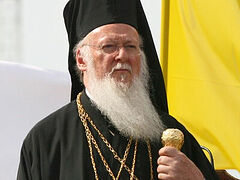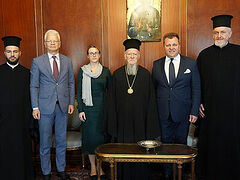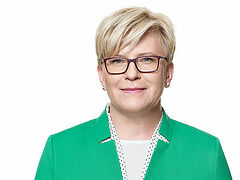Istanbul, February 20, 2023
 Two of the defrocked priests received by Constantinople. Photo: obzor.lt
Two of the defrocked priests received by Constantinople. Photo: obzor.lt
The Patriarchate of Constantinople announced on Friday that it has accepted into its jurisdiction five priests who were defrocked by the Lithuanian Orthodox Church last year.
It thereby establishes its presence in the country, which has been the canonical territory of the Moscow Patriarchate for centuries.
The Patriarchate states that it received the former clerics’ appeal and reversed the canonical discipline imposed upon them. Constantinople alone enjoys the right of receiving clerics from other Local Churches without a release from the canonical authority over them, the Patriarchate claims.
OrthoChristian reported on the defrocking of the first of the five priests, Fr. Ginataras Singaila, in June.
Several charges were leveled against him, including schismatic activity and the organization of the transition to another Church jurisdiction without the blessing of the bishop (Canon 16 of the 1st Ecumenical Council)—a charge that is confirmed by Constantinople’s communiqué:
Some months ago, the Very Reverend Archpriests from Lithuania, Vladimiras Seliavko and Vitalijus Mockus, and the Reverend Presbyters Vitalis Dauparas, Gintaras Sungaila and Georgy Ananiev, who were imposed the penalty of deposition from the priesthood by the Patriarchate of Moscow, addressed His All-Holiness Bartholomew, Archbishop of Constantinople – New Rome and Ecumenical Patriarch by letter to exercise the petition of appeal before Him, as they are entitled.
Our Patriarch, who exclusively bears the responsibility of receiving appeals, in accordance with the Holy and Sacred Canons (namely, Canons 9 and 17 of the Fourth Ecumenical Council) and the sanctified practice of the Church, received these submitted petitions.
Following thorough study of the relevant circumstances, it was ascertained on the one hand that these cases were made final before the ecclesiastical authority that imposed these penalties, and on the other hand that the reasons for which the penalties were imposed do not at all derive from ecclesiastical criteria, but from the justified opposition of these clergymen to the war in Ukraine. Wherefore, irrevocably adjudicating these petitions of appeal, His All-Holiness recommended to the Holy and Sacred Synod that the imposed deposition from the priesthood be lifted and that they be restored to their former ecclesiastical rank of priesthood, which was unanimously decided.
Moreover, after the above-mentioned restoration, upon their request, the Ecumenical Patriarch received these clergymen under His venerable omophorion, taking into consideration the long-established right of the Ecumenical Throne, as it is also indicatively reported in the interpretation by Theodore Balsamon of Antioch to Canons 17 and 18 of the Council in Trullo and Canon 10 of the Seventh Ecumenical Council (namely: " From this canon, note explicitly that only the Patriarch of Constantinople is allowed to receive foreign clergy, even without a letter of release from their ordaining hierarchy ”).
The defrocked clerics have continually maintained that they were punished for their anti-war stances. However, the Lithuanian Church itself has also repeatedly condemned the war in the persons if its hierarchs, Metropolitan Innokenty of Vilnius and Bishop Ambrose of Trakai, and through a general assembly of hierarchs, clergy, monastics, and lay representatives, which reaffirmed its anti-war stance as recently as late December.
The Lithuanian Orthodox Church published a response later on Friday, rejecting Constantinople’s action on its canonical territory:
The Lithuanian Orthodox Archdiocese does not recognize this decision. Defrocking is not a disciplinary, but a mystical act, and it is final and irrevocable. According to Church canons, clerics who have been defrocked are not subject to restoration and ordination. Thus, the former priests Vladimir Seliavko, Vitaly Motskus, Vitaly Dauparas, Gintaras Sungaila and George Ananiev are laymen and will remain so even if they dare to put on vestments and “officiate.” The Sacraments cannot be performed by a defrocked priest.
It seems that the information received in the name of His Holiness Patriarch Bartholomew is neither complete, nor reliable, nor objective. Otherwise, how can we explain the statement contained in the communiqué that “the reasons for which the penalties were imposed do not at all derive from ecclesiastical criteria, but from the justified opposition of these clergymen to the war in Ukraine?” This statement is not true.
The Lithuanian Orthodox Archdiocese has repeatedly stressed that the ecclesiastical court considered the acts of the above-mentioned clerics exclusively in the plane of Church canon law. Their anti-war position did not affect the decision in any way. Moreover, the attitude of former priests to the war in Ukraine is no different from the position of the Lithuanian Orthodox Church. The former clerics are well aware that the Lithuanian Orthodox Church condemned the aggression and war against Ukraine the very next day after it began, on February 25, 2022.
Metropolitan Innokenty condemned the war and expressed disagreement with the position of Patriarch Kirill in his official statements made in March and April of last year. These statements were noticed throughout the Orthodox world. At the same time, the ecclesiastical trial of the clergy took place much later, at the end of June 2022.
The attack on Ukraine has been condemned at all levels—by the hierarchs, clergy, and laity. The relevant appeals with thousands of signatures were handed over to the president of the Republic of Lithuania. The General Assembly of the Lithuanian Orthodox Church also expressed full support for the position of the Archdiocese.
The former clerics were expelled from holy orders for committing a number of grave ecclesiastical crimes. Their activities were examined in detail by the ecclesiastical court, which confirmed the facts of violating the priestly oath and perjury (Canon 25 of the Holy Apostles), disobedience to the ruling bishop and conducting public activities without the blessing of their bishop (Canon 39 of the Holy Apostles), collusion against their bishop and fellow clergy, as well as the destruction of ecclesiastical peace (Canon 18 of the Fourth Ecumenical Council and Canon 34 of the Quinisext Trullo Council), schismatic activity, the intention and organization of the transition to another Church jurisdiction without the blessing of their bishop (Canon 16 of the First Ecumenical Council), as well as their participation in the campaign to discredit the Church and its bishops (Canon 55 of the Holy Apostles), as well as fellow clergy. Each of the items on this list is confirmed by specific actions and public statements from the former clerics, as well as witness testimony.
The Lithuanian Orthodox Church daily offers prayers for the end of the war in Ukraine, as well as for our Lithuanian country, its people, authorities, and troops.
Follow OrthoChristian on Twitter, Vkontakte, Telegram, WhatsApp, MeWe, and Gab!




